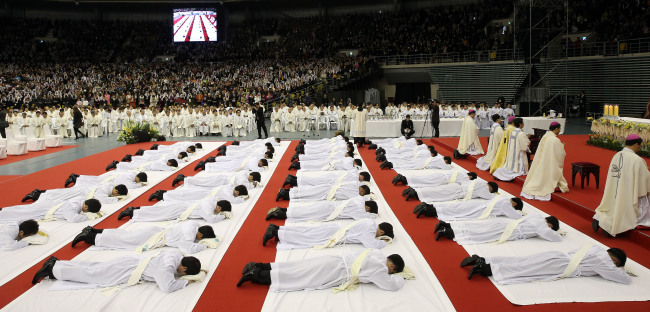At a cathedral in Gwangju, named after the May 18, 1980 Democratic Uprising in the city, over 1,200 Catholics gathered for a special Mass on Monday. It seemed clear that they believed Korea’s democracy has fallen into a deplorable state, so much so that a Mass for its salvage ― last held during the uprising over 30 years ago ― is needed again. In a sermon, a senior priest said that it was time that the people stand up to oust President Park Geun-hye, who is refusing to step down despite “evidences of a fraudulent presidential election campaign.”
Not far from the cathedral, another group ― a much smaller one ― gathered with a distinctly different view of how things stand in Korea. To their eyes, the people attending the mass and the priests who organized it were an evil force dividing the church and the nation.
Hundreds of police were mobilized in the area to prevent any possible clash between the two groups.
Similar scenes have occurred in the past weeks ― in Seoul, Suwon, Gyeonggi Province and Geoje, South Gyeongsang Province.
Korea’s seemingly unbridgeable left-right divide is spilling into the nation’s third-most-popular religion, pitting conservative Catholics against progressives.
“The church, too, can’t escape from the great political divide engulfing Korea,” said a religion expert, asking his name to be withdrawn. “Lately, the progressive priests have been speaking out, organizing special masses. That must have prompted their opponents to speak up in response.”
By progressive priests, the expert was referring to the Catholic Priests’ Association for Justice and the like-minded priests, like those who organized the Monday Mass in Gwangju.
In a series of special services, they called on President Park to step down and her predecessor, Lee Myung-bak, to be arrested over the National Intelligence Service’s alleged meddling in the 2012 presidential election campaign.
“We can only conclude that a president who ignores people’s demands for the truth and displays characteristics of a stubborn dictator is acknowledging that she is no longer the president chosen by the people of Korea,” the priests have said in a statement issued in one of the masses.
Conservative Catholics have launched a group to counter the left-leaning priests late last year.
Christened “Catholics’ gathering to protect the Republic of Korea,” the group calls itself a representative of ordinary believers who have grown sick and tired of their activist priests.
“We want them (progressive priests) out of the church,” Suh Suk-koo, an attorney and one of the group’s leaders, told The Korea Herald. “All the things they stand for are in sync with the North Korean propaganda. But they pose as if they speak on behalf of the Korean Church, the pope and the Lord.”
Suh said more than 150,000 copies of the group’s booklet detailing their criticism of the CPAJ had been distributed. “It reveals the thirst within the Catholic community for criticism of them.”
The CPAJ has so far refrained from responding to any provocation made by the group. An official there said they have “no official stance” on the group or their criticism.
Historically, the Catholic Church has a widely-esteemed reputation for political involvement during the country’s turbulent democratization process. The CPAJ was launched in 1974 to fight the draconian rule of former President Park Chung-hee, father of the incumbent president.
After the 1987 democratization movement, however, the priest’s club largely focused on promoting social justice and reconciling with North Korea. In October 2007, the group revealed a major corruption scandal involving Samsung Group executives.
Now, horning in on the legitimacy of Park’s presidency itself, the priests appear to have no intention of toning down their criticism.
The rightist group, too, has no plan to do so in their opposition of the priests.
“If they hold masses, we will hold rallies. This is to show that we disagree,” Suh said.
Cardinal-appointee Andrew Yeom Soo-jung once spoke against “political intervention” of priests late last year, but reverted his stance a few days later, stressing the social obligation of Church.
By Lee Sun-young (
milaya@heraldcorp.com)





![[Exclusive] Hyundai Mobis eyes closer ties with BYD](http://res.heraldm.com/phpwas/restmb_idxmake.php?idx=644&simg=/content/image/2024/11/25/20241125050044_0.jpg)
![[Herald Review] 'Gangnam B-Side' combines social realism with masterful suspense, performance](http://res.heraldm.com/phpwas/restmb_idxmake.php?idx=644&simg=/content/image/2024/11/25/20241125050072_0.jpg)

